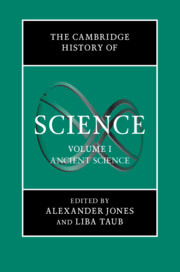Refine search
Actions for selected content:
13588 results in History of science and technology
2 - Babylonian Medicine as a Discipline
- from Part I - Mesopotamia
-
-
- Book:
- The Cambridge History of Science
- Published online:
- 01 December 2018
- Print publication:
- 13 December 2018, pp 29-57
-
- Chapter
- Export citation
Part IV - India
-
- Book:
- The Cambridge History of Science
- Published online:
- 01 December 2018
- Print publication:
- 13 December 2018, pp 483-550
-
- Chapter
- Export citation
Part III - Greek and Greco-Roman
-
- Book:
- The Cambridge History of Science
- Published online:
- 01 December 2018
- Print publication:
- 13 December 2018, pp 161-482
-
- Chapter
- Export citation
6 - Egyptian Medicine
- from Part II - Egypt
-
-
- Book:
- The Cambridge History of Science
- Published online:
- 01 December 2018
- Print publication:
- 13 December 2018, pp 120-130
-
- Chapter
- Export citation
8 - Egyptian Mathematics
- from Part II - Egypt
-
-
- Book:
- The Cambridge History of Science
- Published online:
- 01 December 2018
- Print publication:
- 13 December 2018, pp 144-144
-
- Chapter
- Export citation
9 - Physical and Cosmological Thought Before Aristotle
- from Part III - Greek and Greco-Roman
-
-
- Book:
- The Cambridge History of Science
- Published online:
- 01 December 2018
- Print publication:
- 13 December 2018, pp 163-180
-
- Chapter
- Export citation
5 - The Cultural Context of (Mathematical) Experts in Ancient Egypt
- from Part II - Egypt
-
-
- Book:
- The Cambridge History of Science
- Published online:
- 01 December 2018
- Print publication:
- 13 December 2018, pp 101-119
-
- Chapter
- Export citation
16 - Medicine in Early and Classical Greece
- from Part III - Greek and Greco-Roman
-
-
- Book:
- The Cambridge History of Science
- Published online:
- 01 December 2018
- Print publication:
- 13 December 2018, pp 293-315
-
- Chapter
- Export citation
Index
-
- Book:
- The Cambridge History of Science
- Published online:
- 01 December 2018
- Print publication:
- 13 December 2018, pp 617-642
-
- Chapter
- Export citation
30 - Chinese Astronomy in the Early Imperial Age: A Brief Outline
- from Part V - China
-
-
- Book:
- The Cambridge History of Science
- Published online:
- 01 December 2018
- Print publication:
- 13 December 2018, pp 595-616
-
- Chapter
- Export citation
18 - Greek Mathematics
- from Part III - Greek and Greco-Roman
-
-
- Book:
- The Cambridge History of Science
- Published online:
- 01 December 2018
- Print publication:
- 13 December 2018, pp 345-373
-
- Chapter
- Export citation
22 - Harmonics
- from Part III - Greek and Greco-Roman
-
-
- Book:
- The Cambridge History of Science
- Published online:
- 01 December 2018
- Print publication:
- 13 December 2018, pp 428-448
-
- Chapter
- Export citation
Copyright page
-
- Book:
- The Cambridge History of Science
- Published online:
- 01 December 2018
- Print publication:
- 13 December 2018, pp vi-vi
-
- Chapter
- Export citation
15 - Late Antiquity: Science in the Philosophical Schools
- from Part III - Greek and Greco-Roman
-
-
- Book:
- The Cambridge History of Science
- Published online:
- 01 December 2018
- Print publication:
- 13 December 2018, pp 278-292
-
- Chapter
- Export citation
11 - Aristotle’s Physical Theory
- from Part III - Greek and Greco-Roman
-
-
- Book:
- The Cambridge History of Science
- Published online:
- 01 December 2018
- Print publication:
- 13 December 2018, pp 196-214
-
- Chapter
- Export citation
Dedication
- from 8 - Egyptian Mathematics
-
- Book:
- The Cambridge History of Science
- Published online:
- 01 December 2018
- Print publication:
- 13 December 2018, pp 144-160
-
- Chapter
- Export citation
14 - Science after Aristotle: Hellenistic and Roman Science
- from Part III - Greek and Greco-Roman
-
-
- Book:
- The Cambridge History of Science
- Published online:
- 01 December 2018
- Print publication:
- 13 December 2018, pp 248-277
-
- Chapter
- Export citation
10 - Aristotle: An Overview
- from Part III - Greek and Greco-Roman
-
-
- Book:
- The Cambridge History of Science
- Published online:
- 01 December 2018
- Print publication:
- 13 December 2018, pp 181-195
-
- Chapter
- Export citation

The Cambridge History of Science
-
- Published online:
- 01 December 2018
- Print publication:
- 13 December 2018
A hard nut to crack: nutmeg cultivation and the application of natural history between the Maluku islands and Isle de France (1750s–1780s)
-
- Journal:
- The British Journal for the History of Science / Volume 51 / Issue 4 / December 2018
- Published online by Cambridge University Press:
- 19 December 2018, pp. 585-606
- Print publication:
- December 2018
-
- Article
-
- You have access
- HTML
- Export citation
